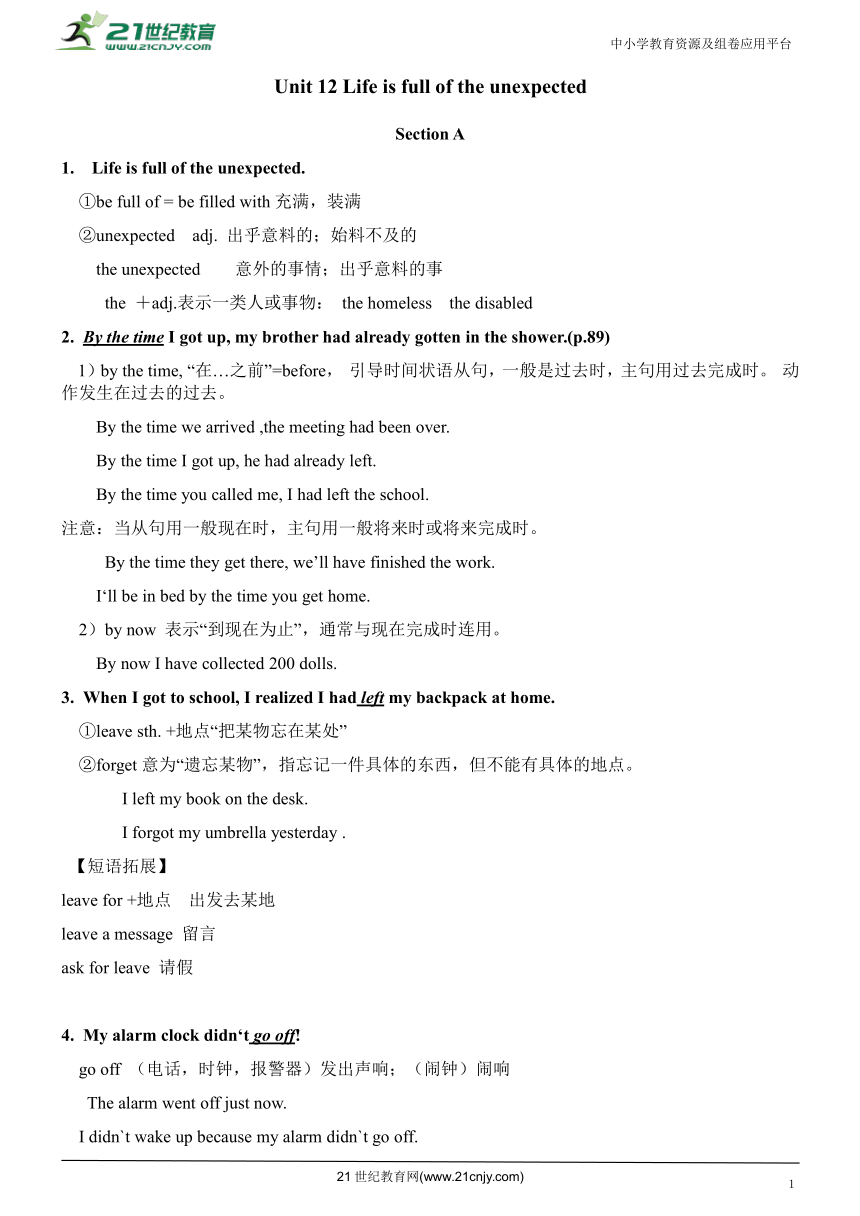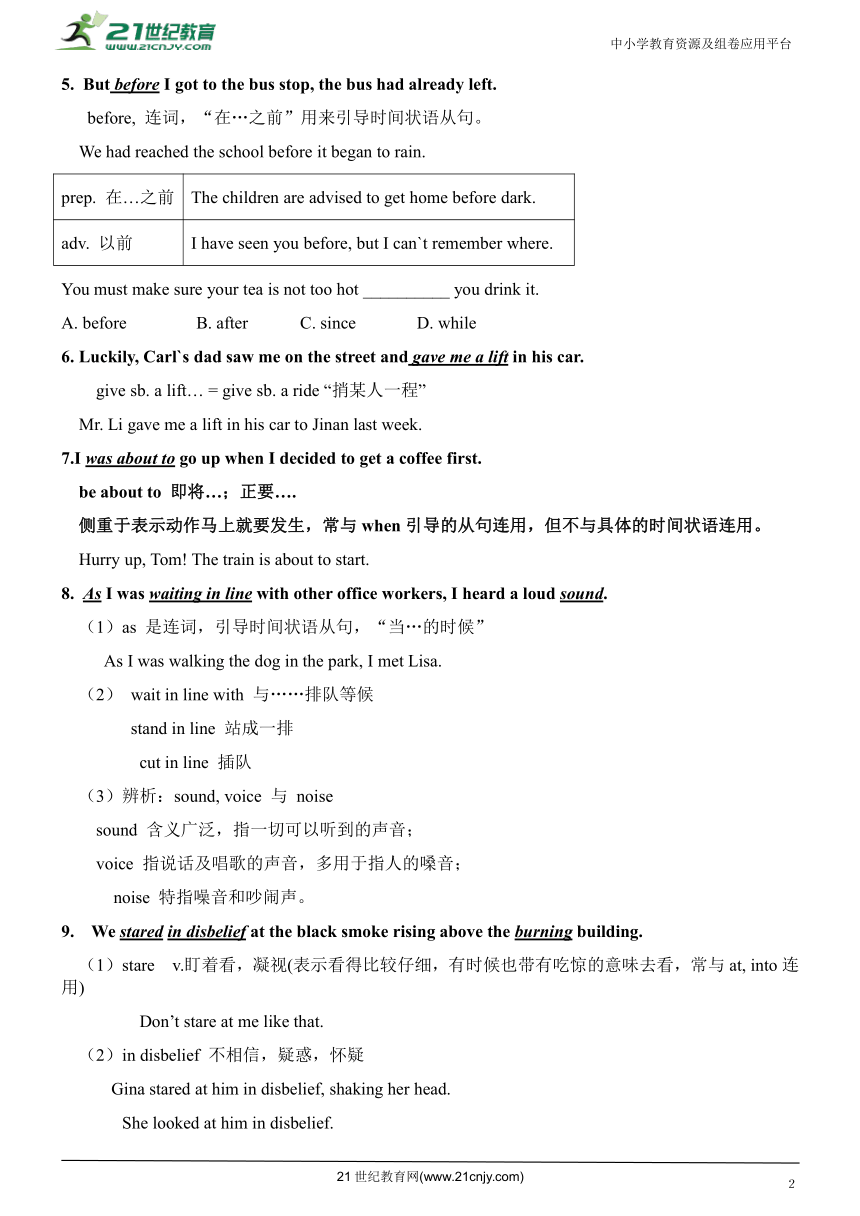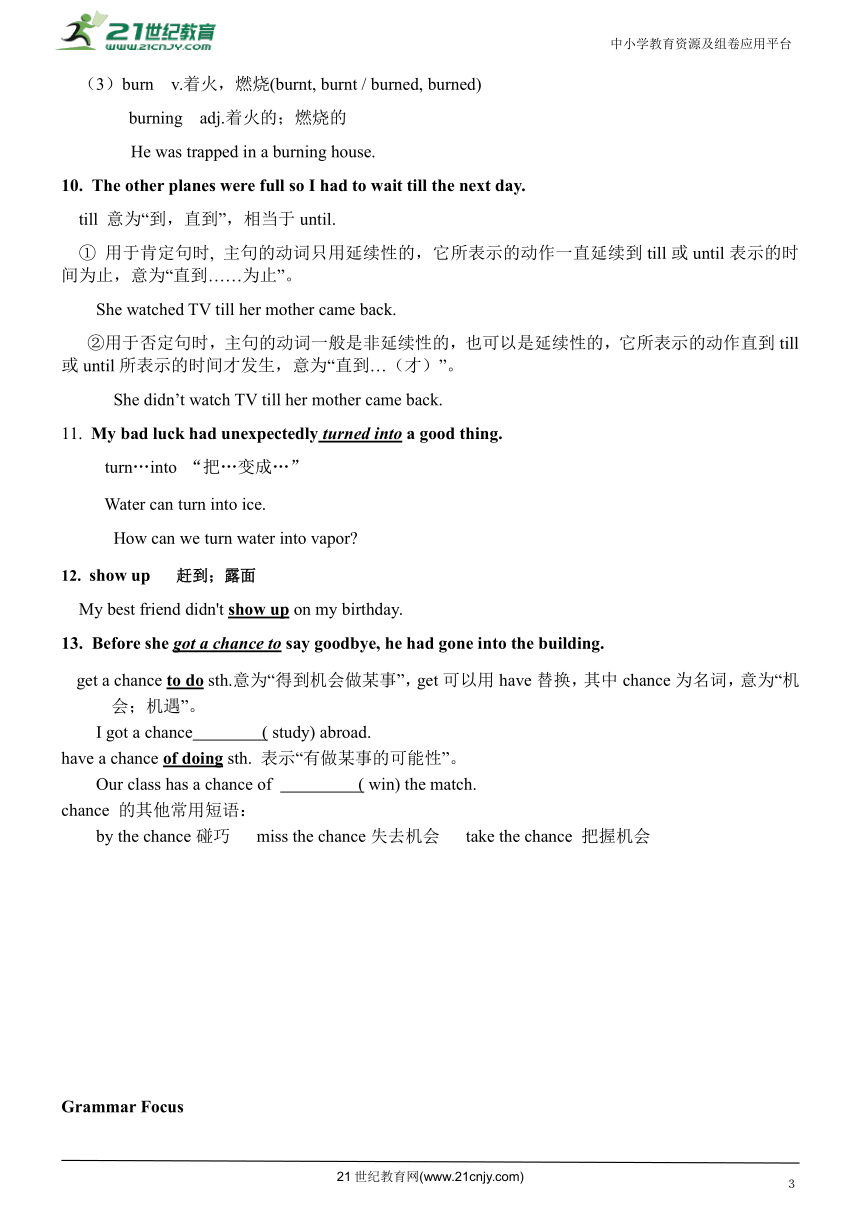Unit 12 Life is full of the unexpected知识点总结归纳【人教版英语九年级全册】
文档属性
| 名称 | Unit 12 Life is full of the unexpected知识点总结归纳【人教版英语九年级全册】 |

|
|
| 格式 | docx | ||
| 文件大小 | 76.3KB | ||
| 资源类型 | 试卷 | ||
| 版本资源 | 人教新目标(Go for it)版 | ||
| 科目 | 英语 | ||
| 更新时间 | 2024-06-20 19:52:25 | ||
图片预览



文档简介
中小学教育资源及组卷应用平台
Unit 12 Life is full of the unexpected
Section A
Life is full of the unexpected.
①be full of = be filled with充满,装满
②unexpected adj. 出乎意料的;始料不及的
the unexpected 意外的事情;出乎意料的事
the +adj.表示一类人或事物: the homeless the disabled
By the time I got up, my brother had already gotten in the shower.(p.89)
1)by the time, “在…之前”=before, 引导时间状语从句,一般是过去时,主句用过去完成时。 动作发生在过去的过去。
By the time we arrived ,the meeting had been over.
By the time I got up, he had already left.
By the time you called me, I had left the school.
注意:当从句用一般现在时,主句用一般将来时或将来完成时。
By the time they get there, we’ll have finished the work.
I‘ll be in bed by the time you get home.
2)by now 表示“到现在为止”,通常与现在完成时连用。
By now I have collected 200 dolls.
When I got to school, I realized I had left my backpack at home.
①leave sth. +地点“把某物忘在某处”
②forget意为“遗忘某物”,指忘记一件具体的东西,但不能有具体的地点。
I left my book on the desk.
I forgot my umbrella yesterday .
【短语拓展】
leave for +地点 出发去某地
leave a message 留言
ask for leave 请假
My alarm clock didn‘t go off!
go off (电话,时钟,报警器)发出声响;(闹钟)闹响
The alarm went off just now.
I didn`t wake up because my alarm didn`t go off.
But before I got to the bus stop, the bus had already left.
before, 连词,“在…之前”用来引导时间状语从句。
We had reached the school before it began to rain.
prep. 在…之前 The children are advised to get home before dark.
adv. 以前 I have seen you before, but I can`t remember where.
You must make sure your tea is not too hot __________ you drink it.
A. before B. after C. since D. while
6. Luckily, Carl`s dad saw me on the street and gave me a lift in his car.
give sb. a lift… = give sb. a ride “捎某人一程”
Mr. Li gave me a lift in his car to Jinan last week.
7.I was about to go up when I decided to get a coffee first.
be about to 即将…;正要….
侧重于表示动作马上就要发生,常与when引导的从句连用,但不与具体的时间状语连用。
Hurry up, Tom! The train is about to start.
As I was waiting in line with other office workers, I heard a loud sound.
(1)as 是连词,引导时间状语从句,“当…的时候”
As I was walking the dog in the park, I met Lisa.
(2) wait in line with 与……排队等候
stand in line 站成一排
cut in line 插队
(3)辨析:sound, voice 与 noise
sound 含义广泛,指一切可以听到的声音;
voice 指说话及唱歌的声音,多用于指人的嗓音;
noise 特指噪音和吵闹声。
We stared in disbelief at the black smoke rising above the burning building.
stare v.盯着看,凝视(表示看得比较仔细,有时候也带有吃惊的意味去看,常与at, into连用)
Don’t stare at me like that.
in disbelief 不相信,疑惑,怀疑
Gina stared at him in disbelief, shaking her head.
She looked at him in disbelief.
burn v.着火,燃烧(burnt, burnt / burned, burned)
burning adj.着火的;燃烧的
He was trapped in a burning house.
The other planes were full so I had to wait till the next day.
till 意为“到,直到”,相当于until.
① 用于肯定句时, 主句的动词只用延续性的,它所表示的动作一直延续到till或until表示的时间为止,意为“直到……为止”。
She watched TV till her mother came back.
②用于否定句时,主句的动词一般是非延续性的,也可以是延续性的,它所表示的动作直到till或until所表示的时间才发生,意为“直到…(才)”。
She didn’t watch TV till her mother came back.
My bad luck had unexpectedly turned into a good thing.
turn…into “把…变成…”
Water can turn into ice.
How can we turn water into vapor
show up 赶到;露面
My best friend didn't show up on my birthday.
Before she got a chance to say goodbye, he had gone into the building.
get a chance to do sth.意为“得到机会做某事”,get可以用have替换,其中chance为名词,意为“机会;机遇”。
I got a chance ( study) abroad.
have a chance of doing sth. 表示“有做某事的可能性”。
Our class has a chance of ( win) the match.
chance 的其他常用短语:
by the chance碰巧 miss the chance失去机会 take the chance 把握机会
Grammar Focus
过去完成时
一、过去完成时的概念与结构特点
概念:过去完成时表示在过去某一时间或动作之前已经发生或完成了的动作,即“过去的过去( past-in-the-past )”。
----|-------------------------- |-------------------------------|---------------------------->
那时以前 那时 现在
构成:主语+had+过去分词(p.p),其中 had 通用于各种人称。
They had already had breakfast before they arrived at the hotel.
She had finished the homework by 10 :00 this morning.
①肯定句:主语+had+过去分词.
②否定句:主语+had+not+过去分词.
③一般疑问句:Had+主语+过去分词
肯定回答:Yes,主语+had
否定回答:No,主语+hadn't
④特殊疑问句:特殊疑问词或词组+一般疑问句(Had+主语+过去分词)?
⑤被动语态:主语+had(hadn't)+been+过去分词
二、过去完成时的判断依据
(1)特定的时间状语
① by +过去的时间点 表示“到...为止”
He had finished reading the book by 10 o’clock yesterday.
到昨天10点前, 他一进读完了这本书。
② by the end of +过去的时间点 表示“到...结束前”
We had learned a lot of English songs by the end of last term.
到上学期期末为止我们已经学了很多英文歌曲。
③由by the time, before, when 等引导时间状语从句时, 主从句的动作发生有先后,动作在前的用过去完成时。
By the time I went outside, they had already left.
The train had already left when I got to the station.
They had planted six hundred trees before last Wednesday.
(2) 具体的语境(看动作是否发生在过去的过去)
① 主句为一般过去时, 且宾语从句的动作先于主句的动作发生时, 从句要用过去完成时。
She said that she had seen the film before.
她说她以前已经看过这部电影了。
② 上下文语境。
I met Jim in the street yesterday. We hadn’t seen each other since he went to Beijing.
过去完成时的具体用法
过去完成时动词表示过去某一时间或某一动作之前完成的动作或状态。强调过去某一动作发生在另一动作之前时。
他说他以前见过你。
He said that he had seen (see) you before.
When I woke up, it had stopped raining.
我醒来时,雨已经停了。(主句的动作发生在“过去的过去”)
过去完成时词可以表示过去某一时刻之前发生的动作或呈现的状态,这一动作一直持续或将继续下去。
到了六点钟为止,他们已经工作了八小时了。
By six o’clock they had worked (work)for eight hours.
我到广州时,他在那里很长时间了。
When I came to GZ , he had been (be) there for a long time.
3.过去完成时和 already, just, ever, yet等连用表示过去的过去。
他告诉我说他们队已经赢了。
He told me that his team _________ already ___________ (win).
她说她仍没去过长城。
She said that she _______________(not go to) the Great Wall yet.
一般过去时、现在完成时与过去完成时
1.一般过去时表示在过去某时发生的动作或 存在的状态。
例:We started to learn English 5 years ago. 我们五年前开始学英语。
5 years ago now
2. 现在完成时表示的动作发生在过去,但侧重对现 在产生的结果或造成的影响,与现在有关。其结构为:“助动词 have(has)+过去分词” 。
例:We have learned English for 5 years. 我们已经学了五年的英语了。
5 years ago have learned now
3. 过去完成时表示在过去某个时间或动作之前 已经发生或完成了的动作或存在的状态,即
“过去的过去( past-in-the-past )”。
例:We had learned English for 4 years by last year.
到去年为止,我们已经学英语四年了。
past in the past past now
用所给词的适当形式填空。
1. When I got there, the bus _________ (go).
2. By the time I got to class, the teacher ___________ (start) the class.
3. We _____________ (learn) over 1,000 words by the end of last term.
4. I ___________ (clean) the room before he arrived here.
根据汉语提示完成句子。
1.当我到达学校的时候,我才意识到我把书包忘在家里了。
_______ I got to school, I realized that I ______ ______ my backpack at home.
2.到我返回学校的时候,铃声已经响过了。
_____ _____ _____ I got back to school, the bell ______ _______.
3.我到达公共汽车站之前, 汽车已经离开了。
Before I _____ _____ the bus stop, the bus ______ _______ _______.
4.我决定先买一杯咖啡,然后再去办公室。
I ______ ______ ______ go up to my office when I decided to get a coffee first.
Section B
embarrass v 使尴尬→embarrassed adj.尴尬的(用来修饰人)
→embarrassing adj.令人难堪的((修饰物)
to one’s embarrassment 令某人尴尬的是
The lady was very embarrassed when they asked her age.
She asked a lot of embarrassing questions.
2b
It happens on April 1st every year and is a day when many people play all kinds of tricks and jokes on each other.
when 关系副词引导的定语从句,修饰先行词day
I still remember the day when I first met Jennifer.
play tricks on sb. 捉弄某人
The children played tricks on their new neighbor.
play jokes on sb. 对某人开玩笑
trick or treat (万圣节用语)不给糖就捣蛋
Many people ran to their local supermarkets to buy as much spaghetti as they could.
as…as one can/could = as…as possible “尽可能…”
Mr. Smith said his son was as __________ as his daughter.
A. hard-working B. more hard-working C. the most hard-working
4. By the time people realize that the story was a hoax, all of the spaghetti across the country had been sold out.
sell out”卖完,卖光” sell- sold - sold
be sold out.”被卖光”
When she went to the shop to buy some apples, they had been sold out.
5.In another famous trick a TV show in England reported the discovery of special water.
discovery, n. “发现,发觉”
作文(3b)
What an Unforgettable(难以忘记的)Day
Yesterday was a really bad day for me.
To start with, my alarm clock didn’t go off so that I got up late. By the time I got up, my father had already gotten into the shower. Then I rushed to(冲向)the bus stop without breakfast. By the time I got there, the bus had already left and I had to rushed to school. When I got to school, my teacher had already started teaching and he was really angry with me. Then it was time to hand in(上交)homework, but I had left it at home. I was really embarrassed at that time.
One good thing was that my history teacher said something good to me because I had done a lot to prepare for this class. It was the only good thing for me yesterday.
21世纪教育网(www.21cnjy.com)
Unit 12 Life is full of the unexpected
Section A
Life is full of the unexpected.
①be full of = be filled with充满,装满
②unexpected adj. 出乎意料的;始料不及的
the unexpected 意外的事情;出乎意料的事
the +adj.表示一类人或事物: the homeless the disabled
By the time I got up, my brother had already gotten in the shower.(p.89)
1)by the time, “在…之前”=before, 引导时间状语从句,一般是过去时,主句用过去完成时。 动作发生在过去的过去。
By the time we arrived ,the meeting had been over.
By the time I got up, he had already left.
By the time you called me, I had left the school.
注意:当从句用一般现在时,主句用一般将来时或将来完成时。
By the time they get there, we’ll have finished the work.
I‘ll be in bed by the time you get home.
2)by now 表示“到现在为止”,通常与现在完成时连用。
By now I have collected 200 dolls.
When I got to school, I realized I had left my backpack at home.
①leave sth. +地点“把某物忘在某处”
②forget意为“遗忘某物”,指忘记一件具体的东西,但不能有具体的地点。
I left my book on the desk.
I forgot my umbrella yesterday .
【短语拓展】
leave for +地点 出发去某地
leave a message 留言
ask for leave 请假
My alarm clock didn‘t go off!
go off (电话,时钟,报警器)发出声响;(闹钟)闹响
The alarm went off just now.
I didn`t wake up because my alarm didn`t go off.
But before I got to the bus stop, the bus had already left.
before, 连词,“在…之前”用来引导时间状语从句。
We had reached the school before it began to rain.
prep. 在…之前 The children are advised to get home before dark.
adv. 以前 I have seen you before, but I can`t remember where.
You must make sure your tea is not too hot __________ you drink it.
A. before B. after C. since D. while
6. Luckily, Carl`s dad saw me on the street and gave me a lift in his car.
give sb. a lift… = give sb. a ride “捎某人一程”
Mr. Li gave me a lift in his car to Jinan last week.
7.I was about to go up when I decided to get a coffee first.
be about to 即将…;正要….
侧重于表示动作马上就要发生,常与when引导的从句连用,但不与具体的时间状语连用。
Hurry up, Tom! The train is about to start.
As I was waiting in line with other office workers, I heard a loud sound.
(1)as 是连词,引导时间状语从句,“当…的时候”
As I was walking the dog in the park, I met Lisa.
(2) wait in line with 与……排队等候
stand in line 站成一排
cut in line 插队
(3)辨析:sound, voice 与 noise
sound 含义广泛,指一切可以听到的声音;
voice 指说话及唱歌的声音,多用于指人的嗓音;
noise 特指噪音和吵闹声。
We stared in disbelief at the black smoke rising above the burning building.
stare v.盯着看,凝视(表示看得比较仔细,有时候也带有吃惊的意味去看,常与at, into连用)
Don’t stare at me like that.
in disbelief 不相信,疑惑,怀疑
Gina stared at him in disbelief, shaking her head.
She looked at him in disbelief.
burn v.着火,燃烧(burnt, burnt / burned, burned)
burning adj.着火的;燃烧的
He was trapped in a burning house.
The other planes were full so I had to wait till the next day.
till 意为“到,直到”,相当于until.
① 用于肯定句时, 主句的动词只用延续性的,它所表示的动作一直延续到till或until表示的时间为止,意为“直到……为止”。
She watched TV till her mother came back.
②用于否定句时,主句的动词一般是非延续性的,也可以是延续性的,它所表示的动作直到till或until所表示的时间才发生,意为“直到…(才)”。
She didn’t watch TV till her mother came back.
My bad luck had unexpectedly turned into a good thing.
turn…into “把…变成…”
Water can turn into ice.
How can we turn water into vapor
show up 赶到;露面
My best friend didn't show up on my birthday.
Before she got a chance to say goodbye, he had gone into the building.
get a chance to do sth.意为“得到机会做某事”,get可以用have替换,其中chance为名词,意为“机会;机遇”。
I got a chance ( study) abroad.
have a chance of doing sth. 表示“有做某事的可能性”。
Our class has a chance of ( win) the match.
chance 的其他常用短语:
by the chance碰巧 miss the chance失去机会 take the chance 把握机会
Grammar Focus
过去完成时
一、过去完成时的概念与结构特点
概念:过去完成时表示在过去某一时间或动作之前已经发生或完成了的动作,即“过去的过去( past-in-the-past )”。
----|-------------------------- |-------------------------------|---------------------------->
那时以前 那时 现在
构成:主语+had+过去分词(p.p),其中 had 通用于各种人称。
They had already had breakfast before they arrived at the hotel.
She had finished the homework by 10 :00 this morning.
①肯定句:主语+had+过去分词.
②否定句:主语+had+not+过去分词.
③一般疑问句:Had+主语+过去分词
肯定回答:Yes,主语+had
否定回答:No,主语+hadn't
④特殊疑问句:特殊疑问词或词组+一般疑问句(Had+主语+过去分词)?
⑤被动语态:主语+had(hadn't)+been+过去分词
二、过去完成时的判断依据
(1)特定的时间状语
① by +过去的时间点 表示“到...为止”
He had finished reading the book by 10 o’clock yesterday.
到昨天10点前, 他一进读完了这本书。
② by the end of +过去的时间点 表示“到...结束前”
We had learned a lot of English songs by the end of last term.
到上学期期末为止我们已经学了很多英文歌曲。
③由by the time, before, when 等引导时间状语从句时, 主从句的动作发生有先后,动作在前的用过去完成时。
By the time I went outside, they had already left.
The train had already left when I got to the station.
They had planted six hundred trees before last Wednesday.
(2) 具体的语境(看动作是否发生在过去的过去)
① 主句为一般过去时, 且宾语从句的动作先于主句的动作发生时, 从句要用过去完成时。
She said that she had seen the film before.
她说她以前已经看过这部电影了。
② 上下文语境。
I met Jim in the street yesterday. We hadn’t seen each other since he went to Beijing.
过去完成时的具体用法
过去完成时动词表示过去某一时间或某一动作之前完成的动作或状态。强调过去某一动作发生在另一动作之前时。
他说他以前见过你。
He said that he had seen (see) you before.
When I woke up, it had stopped raining.
我醒来时,雨已经停了。(主句的动作发生在“过去的过去”)
过去完成时词可以表示过去某一时刻之前发生的动作或呈现的状态,这一动作一直持续或将继续下去。
到了六点钟为止,他们已经工作了八小时了。
By six o’clock they had worked (work)for eight hours.
我到广州时,他在那里很长时间了。
When I came to GZ , he had been (be) there for a long time.
3.过去完成时和 already, just, ever, yet等连用表示过去的过去。
他告诉我说他们队已经赢了。
He told me that his team _________ already ___________ (win).
她说她仍没去过长城。
She said that she _______________(not go to) the Great Wall yet.
一般过去时、现在完成时与过去完成时
1.一般过去时表示在过去某时发生的动作或 存在的状态。
例:We started to learn English 5 years ago. 我们五年前开始学英语。
5 years ago now
2. 现在完成时表示的动作发生在过去,但侧重对现 在产生的结果或造成的影响,与现在有关。其结构为:“助动词 have(has)+过去分词” 。
例:We have learned English for 5 years. 我们已经学了五年的英语了。
5 years ago have learned now
3. 过去完成时表示在过去某个时间或动作之前 已经发生或完成了的动作或存在的状态,即
“过去的过去( past-in-the-past )”。
例:We had learned English for 4 years by last year.
到去年为止,我们已经学英语四年了。
past in the past past now
用所给词的适当形式填空。
1. When I got there, the bus _________ (go).
2. By the time I got to class, the teacher ___________ (start) the class.
3. We _____________ (learn) over 1,000 words by the end of last term.
4. I ___________ (clean) the room before he arrived here.
根据汉语提示完成句子。
1.当我到达学校的时候,我才意识到我把书包忘在家里了。
_______ I got to school, I realized that I ______ ______ my backpack at home.
2.到我返回学校的时候,铃声已经响过了。
_____ _____ _____ I got back to school, the bell ______ _______.
3.我到达公共汽车站之前, 汽车已经离开了。
Before I _____ _____ the bus stop, the bus ______ _______ _______.
4.我决定先买一杯咖啡,然后再去办公室。
I ______ ______ ______ go up to my office when I decided to get a coffee first.
Section B
embarrass v 使尴尬→embarrassed adj.尴尬的(用来修饰人)
→embarrassing adj.令人难堪的((修饰物)
to one’s embarrassment 令某人尴尬的是
The lady was very embarrassed when they asked her age.
She asked a lot of embarrassing questions.
2b
It happens on April 1st every year and is a day when many people play all kinds of tricks and jokes on each other.
when 关系副词引导的定语从句,修饰先行词day
I still remember the day when I first met Jennifer.
play tricks on sb. 捉弄某人
The children played tricks on their new neighbor.
play jokes on sb. 对某人开玩笑
trick or treat (万圣节用语)不给糖就捣蛋
Many people ran to their local supermarkets to buy as much spaghetti as they could.
as…as one can/could = as…as possible “尽可能…”
Mr. Smith said his son was as __________ as his daughter.
A. hard-working B. more hard-working C. the most hard-working
4. By the time people realize that the story was a hoax, all of the spaghetti across the country had been sold out.
sell out”卖完,卖光” sell- sold - sold
be sold out.”被卖光”
When she went to the shop to buy some apples, they had been sold out.
5.In another famous trick a TV show in England reported the discovery of special water.
discovery, n. “发现,发觉”
作文(3b)
What an Unforgettable(难以忘记的)Day
Yesterday was a really bad day for me.
To start with, my alarm clock didn’t go off so that I got up late. By the time I got up, my father had already gotten into the shower. Then I rushed to(冲向)the bus stop without breakfast. By the time I got there, the bus had already left and I had to rushed to school. When I got to school, my teacher had already started teaching and he was really angry with me. Then it was time to hand in(上交)homework, but I had left it at home. I was really embarrassed at that time.
One good thing was that my history teacher said something good to me because I had done a lot to prepare for this class. It was the only good thing for me yesterday.
21世纪教育网(www.21cnjy.com)
同课章节目录
- Unit 1 How can we become good learners.
- Section A
- Section B
- Unit 2 I think that mooncakes are delicious!
- Section A
- Section B
- Unit 3 Could you please tell me where the restroom
- Section A
- Section B
- Unit 4 I used to be afraid of the dark.
- Section A
- Section B
- Unit 5 What are the shirts made of?
- Section A
- Section B
- Review of Units 1-5
- Unit 6 When was it invented?
- Section A
- Section B
- Unit 7 Teenagers should be allowed to choose their
- Section A
- Section B
- Unit 8 It must belong to Carla.
- Section A
- Section B
- Unit 9 I like music that I can dance to.
- Section A
- Section B
- Unit 10 You're supposed to shake hands.
- Section A
- Section B
- Review of Units 6-10
- Unit 11 Sad movies make me cry.
- Section A
- Section B
- Unit 12 Life is full of the unexpected
- Section A
- Section B
- Unit 13 We're trying to save the earth!
- Section A
- Section B
- Unit 14 I remember meeting all of you in Grade 7.
- Section A
- Section B
- Review of Units 11-14
